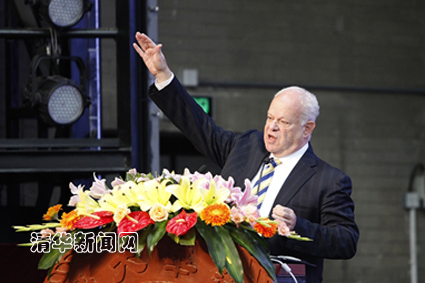China International Conference on Positive Psychology Held at Tsinghua

The 2nd China International Conference on Positive Psychology, organized by Tsinghua University and the International Positive Psychology Association (IPPA), was held at Tsinghua from November 9th to 11th.
Tsinghua University Council, Vice Chairperson Shi Zongkai, Professor Martin Seligman, Founder of International Positive Psychology and Director of the Positive Psychology Center at the University of Pennsylvania, Professor Carmelo Vazquez from Complutense University in Madrid (Spain), and Yang Yufang, Director of the Chinese Psychological Society, attended the conference.

Approximately 1000 attendees, including eminent scholars from both at home and abroad, college teachers, students, professionals and other people interested in Positive Psychology and the science of happiness, participated in the conference.
The conference was composed of academic meetings and thematic forums. The academic meetings included presentations, panel discussions and the use of bulletin boards. The discussions emphasized both the theoretical exploration and the realistic application of ideas. They also focused on both academic research and social development. A primary aim of the conference was to synthesize the best of the results from these discussions and interactions.

The 1st China International Conference on Positive Psychology was held at Tsinghua University in 2010.
Positive Psychology was a movement started within Psychology, at the end of the last millennium. It began in the United States, and was fathered by the aforementioned psychologist Martin Seligman. Positive Psychology, by definition, is an ideological trend to study the positive aspects of human beings such as their strengths and virtues, while utilizing mature and effective scientific methods and measurement, from modern psychology. The object of study within Positive Psychology is ordinary people. It requires psychologists to have a more open and appreciative mindset towards the study of human potential, motivation and capabilities. Positive Psychology is a new model in psychological research, in contrast with the conventional emphasis on negative mental states such as psychological barriers, problems, pains and confusions. Positive Psychology advocates that mankind should use a more positive mindset to interpret mental phenomena (including mental problems as they are usually described). Doing so, triggers in every individual an intrinsic, realistic or potentially positive quality or strength. Thus encouraging each individual to strive towards attaining their own goals in relation to happiness. Positive Psychology proposes to have each individual's intrinsic positive strengths as the subject of its research, and emphasizes that the application of psychology should not only be to help people survive and develop under adversity, but to also help people under normal circumstances, learn to establish a higher quality of personal and social life.

